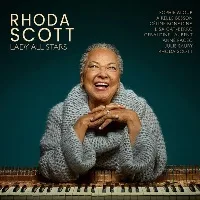Year: 2019
File: MP3@320K/s
Time: 33:55
Size: 79,3 MB
Art: Front
(2:50) 1. One Note Samba
(2:53) 2. Melodle d'Amour
(2:50) 3. The Glft
(2:06) 4. The Sweetest Sounds
(2:43) 5. Dansero
(2:30) 6. Blame It on the Bossa Nova
(2:46) 7. Desafinado
(3:02) 8. The Message
(1:45) 9. Almost Like Being in Love
(1:47) 10. Moon River
(2:14) 11. The Coffee Song
(1:47) 12. I Remember You
(2:23) 13. Sweet Talk
(2:11) 14. Oba Oba
Edith Gormezano, better known as Eydie Gormé, was an American singer who sang for albums, television, broadways, stage concerts and in nightclubs. She performed both solo as well as along with her husband, Steve Lawrence. The duo met while working for the ‘Tonight!’ show with Steve Allen and became a successful team. In the 1950s and 1960s, she consistently released singles and albums. Some of her best-known work include ‘Blame It on the Bossa Nova’ and the Spanish album ‘Amor’. Along with her husband, she released the album ‘We Got Us’ which won a Grammy Award. Individually too, she won a Grammy for her single ‘If He Walked Into My Life’. During the latter part of her career, the couple created TV tributes for famous composers with one of them even bagging the prestigious Emmy Awards.
Eydie Gorme was born on August 16th 1928 in the Bronx, New York to parents who were Turkish-born Jews of Spanish descent. Her father, Nessim Garmezano, was an immigrant tailor who changed his name when he settled in the US. Her mother’s name was Fortune Gorme. Eydie had two older siblings by the name of Corene and Robert. Her two siblings were trained in music, however, since they did not do much in the field, Eydie, was not given music training. At the tender age of three, she debuted as a singer by participating in a children’s radio show being broadcast at a departmental store.
She went to William Howard Taft High School in The Bronx and graduated from there in 1946. While there, she prominently featured in school musicals. During weekends, she sang for a band led by her friend Ken Greengrass. After high school, she joined the City College of New York to study foreign trade and economics. She studied at nights and during daytime worked as an interpreter and later manager for a theatrical supply export company. During weekends though, she still continued to perform for the Greengrass band. After sometime, she quit her job to try her luck in singing. Her friend Ken Greengrass became her manager.More https://www.thefamouspeople.com/profiles/eydie-gorm-47288.php
Eydie Gorme was born on August 16th 1928 in the Bronx, New York to parents who were Turkish-born Jews of Spanish descent. Her father, Nessim Garmezano, was an immigrant tailor who changed his name when he settled in the US. Her mother’s name was Fortune Gorme. Eydie had two older siblings by the name of Corene and Robert. Her two siblings were trained in music, however, since they did not do much in the field, Eydie, was not given music training. At the tender age of three, she debuted as a singer by participating in a children’s radio show being broadcast at a departmental store.
She went to William Howard Taft High School in The Bronx and graduated from there in 1946. While there, she prominently featured in school musicals. During weekends, she sang for a band led by her friend Ken Greengrass. After high school, she joined the City College of New York to study foreign trade and economics. She studied at nights and during daytime worked as an interpreter and later manager for a theatrical supply export company. During weekends though, she still continued to perform for the Greengrass band. After sometime, she quit her job to try her luck in singing. Her friend Ken Greengrass became her manager.More https://www.thefamouspeople.com/profiles/eydie-gorm-47288.php
Blame It on the Bossa Nova




















